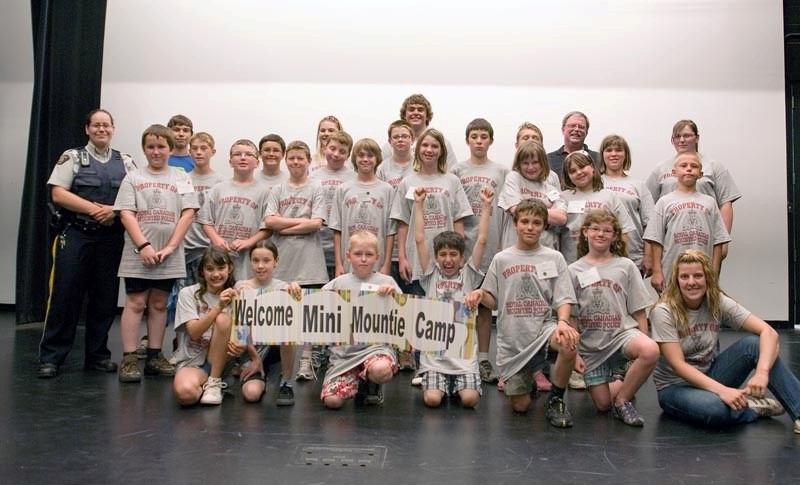They talked about Internet safety and bullying; they watched the fire department crush a car; they investigated a crime; they were this year’s Barrhead Mini Mounties.
The Mini Mounties camp made an appearance for a third year in Barrhead Wednesday, July 11 and Thursday, July 12. For 22 10-12 year olds up to the challenge, these two days were jam-packed full of learning experiences and challenging activities.
The aim of the camp was to have a summer camp atmosphere that reflected police-type topics and training. Those who attended the camp participated in lessons and activities that felt similar to police training.
The two-day camp began with orientation, where the group of Mini Mounties were shown a video about Depot, the RCMP training academy in Regina. From there the students moved on to learn about Internet safety, crime scene evidence, note taking, and always being observant.
Campers had a special visit from a full-grown police dog and a police puppy in training. Two dog handlers did a canine presentation, where they demonstrated a drug search, gun search, and police dog attack.
After the dogs came the drugs. The drug presentation showed examples of various drugs, what they do, and how each one affects families.
An obstacle course was up next, and it was no easy task. In fact, the soon-to-be tuckered campers did a small version of the intensive RCMP Physical Abilities Requirement Evaluation. Their energy wasn’t gone for long, because their enthusiasm was high for learning some self defense next.
Perhaps one of many highlights was during a visit from the fire department.
“The kids go outside and they think they’re just going to meet the fire department, but really they towed a vehicle out back, they rolled up with lights and sirens, and ripped the whole vehicle apart,” said RCMP constable Morroco Johnson, who helped run the camp along with Dave Mckenzie. “They took off all the doors and the roof and everything. One of the fire guys sat there and explained everything while the other guys were doing it.”
And that was just day one.
The next morning began with some lessons in forensics, where Johnson explained different aspects of what a police officer needs to get. Johnson said there were so many good questions, she didn’t get through much of what she had planned to touch on.
“There were so many questions I only got to my third slide, and I probably had about 40 slides,” she laughed. “They were good questions too. They were really interested.”
Next up was a treasure hunt. As the campers listened to a presentation on how to ask proper questions, their lesson was interrupted by a fake crime. A thief with his face shielded by a bandana steals a purse, makes threats with a knife, and takes off, leaving the Mini Mounties to pick up the pieces.
“The session starts out with us talking to them about how to properly ask questions. You want to pull out information and get the witnesses talking about what happened. Then boom, this crime happens right in front of them,” said Mckenzie. “So the first thing we say is to get out their notebooks and write everything down. Then we have our female victim come in and they interview her.”
Nearing the end of the day and just around the corner from the camp’s grand finale, campers were visited by an ambulance. They were able to ask questions, which ranged from how many calls the ambulance answers per day, what types of emergencies they respond to, and if the ambulance is allowed to break the speed limit.
A tour of the new ambulance was even permitted.
At the end of the day, campers were put to the final test: to solve a crime.
Armed with their notepads and new knowledge from the past two days, the Mini Mounties set off to solve the case. They were separated into three different departments, and went to different stations where they listened to statements, interviewed witnesses, and studied evidence.
“The whole first day and a half is geared towards them doing well in the investigation, and getting them ready to do that,” said Johnson.
Although they may have looked slightly confused going through the motions, the preparation for crime solving paid off. Each of the three groups successfully figured out who the culprit was, and presented what happened step by step.
“It’s amazing how these kids put this stuff together,” said Mckenzie.
Upon completion of the camp, each Mini Mountie was given a graduation certificate, a badge pin, as well as a bag filled with various goodies.
Johnson said there are different kinds of youth who sign up for the camp each year. There’s those who are interested in becoming a police officer, and this is an opportunity to become even more motivated towards the goal.
“There’s kids who came to our camp the past two or three years, who come up to me now and say, ‘I really want to be a police officer because of that camp,’” she said. “If a kid wants to be a police officer, or in the army, then there’s a certain kind of behaviour we expect from them, and I think this really helps with kids behaviour in the long run.”
“It helps them get through this age where they make decisions based on impulse, as opposed to, ‘this could impact where I want to go,’” added Mckenzie.
On the flip side, Johnson said every year the camp sees youth who are a little bit on the troubled side. Although they may not want to be police officers, and only come because they thought it would be fun, the camp still had a positive impact on them.
“They’re high-risk youth, and they end up having better behaviour and acting differently,” she said. “I think it does help. It’s definitely useful.”


.jpg;w=120;h=80;mode=crop)
